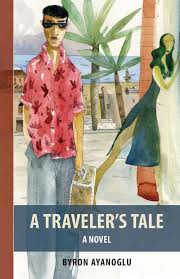In a seaside resort in southwestern Turkey, a man awakens one day seemingly bereft of his former identity. His name and memory are voids, his sole possession a single valise. He finds a hefty stash of American dollars inside his valise, procures a fake passport, and sets out for Istanbul. In cafés and restaurants, former business associates recognize the traveler, helping him back to knowledge of the crime he willed himself to forget.
So begins Byron Ayanoglu’s A Traveler’s Tale, a jet-setting novel with more than its share of cosmopolitan cuisine, financial intrigue, and erotic trysts. After an earlier novel (Love in the Age of Confusion), the book is Ayanoglu’s second published work of fiction. Ayanoglu’s two great passions, food and travel – amply evident in the numerous cookbooks, restaurant guides, and travel books he has written – fuel the narrative, making for a compelling though somewhat disjointed reading experience.
The book is structured in two halves arranged in reverse chronological order. In the first half, the peregrinations of the first-person narrator lead the reader through the cafés of Istanbul, where the narrator dines with strangers and receives a slap in the face from an angry former lover. On a whim, the traveler goes to Mumbai where a wealthy Indian aristocrat invites him back to his ancestral palace, after having surprised him at the airport: “People seem to know more about me and my movements than I [do],” the narrator thinks. With the help of a woman he follows to southern India, he begins to admit that he has committed a crime involving a large sum of money and that he has been “trying to submerge the shame and hopelessness of it in a state of willful amnesia.”

A Traveler’s Tale
Byron Ayanoglu
DC Books
$18.95
paper
167pp
978-1-897190-92-0
Nevertheless, amidst all the glitz and gourmet, there is an underlying moral: you can run from your past, but you can’t escape it. Through white-collar crimes, Hunter tries to distance himself from his childhood and then disavows his crime and his former self. The weight of the past is the book’s central theme, but it remains woefully underdeveloped. Instead, A Traveler’s Tale luxuriates in the beauty of surfaces, namely carnal pleasures and epicurean delights. mRb






0 Comments